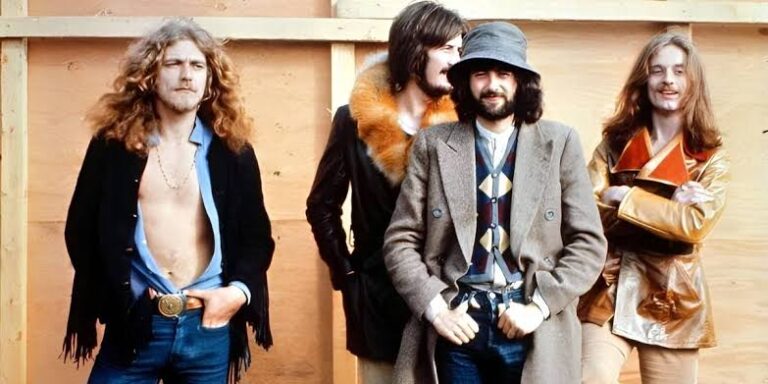50 Years Later, Led Zeppelin Fans Are Still Discovering the Hidden Meaning in “Stairway to Heaven”
Half a century after its original release, Led Zeppelin’s iconic masterpiece “Stairway to Heaven” continues to mesmerize, mystify, and ignite passionate debate. First heard in 1971 as the centerpiece of the band’s untitled fourth album (Led Zeppelin IV), the nearly eight-minute track has become one of the most analyzed and interpreted songs in rock history. And now — fifty years later — fans across generations are still uncovering layers of hidden meaning, poetic ambiguity, and sonic mysticism that keep “Stairway” alive in the cultural consciousness.
What is it about this song that refuses to fade?
A Journey in Every Note
From its ethereal acoustic intro to its thunderous electric climax, “Stairway to Heaven” is more than just a rock song — it’s an emotional journey. Written by guitarist Jimmy Page and vocalist Robert Plant, the song’s cryptic lyrics and shifting musical structure have sparked endless interpretation.
“It was a song of aspiration,” Plant said in a 2012 interview. “It was about a spiritual quest — for something more, something that can’t be bought.”
The lyrics begin with the haunting line:
“There’s a lady who’s sure all that glitters is gold / And she’s buying a stairway to heaven.”
That simple phrase has captivated listeners for decades. Is it a critique of materialism? A metaphor for the emptiness of chasing illusions? Or a veiled commentary on the spiritual crises of the modern world?
For many, the beauty lies in its mystery.
Hidden Layers, New Discoveries
While the song has long been seen as poetic and mystical, fans and music scholars alike continue to revisit its structure and lyrics in search of deeper meaning.
Recent online discussions and podcasts have unearthed theories that connect “Stairway” to ancient mythology, alchemy, and even biblical references. One theory, gaining traction on forums like Reddit and YouTube, explores the song as an allegory for personal transformation — a musical “hero’s journey” in which the protagonist ascends through stages of self-awareness and spiritual awakening.
Another analysis focuses on the line:
“Sometimes words have two meanings.”
A clever nod, fans say, to the duality of the entire song: heaven and earth, light and dark, illusion and truth.
The late John Bonham’s dynamic drumming, introduced only after the halfway mark, has also been re-evaluated as symbolic — a heartbeat of awakening, a call to action. Jimmy Page’s legendary solo, widely considered one of the greatest in rock history, has been described as the “sonic breakthrough” from illusion to realization.
Still Controversial, Still Sacred
Over the decades, “Stairway to Heaven” has also been at the center of controversy — including legal battles over its originality and accusations of hidden satanic messages when played in reverse (claims debunked but still whispered among conspiracy circles).
Yet none of that has dimmed its power. If anything, the song’s mythic aura has only grown. In 2024, Rolling Stone ranked it #1 on its list of “Songs That Changed the World Without Saying Too Much.” And earlier this year, Led Zeppelin’s official YouTube channel surpassed 1 billion views of the “Stairway to Heaven” live performance from The Song Remains the Same film.
A Song That Transcends Time
At its heart, “Stairway to Heaven” endures because it means something different to every listener.
For a teenager in 1971, it was the soundtrack of rebellion and discovery.
For fans in the 80s and 90s, it became a classic played at proms and memorials.
Today, Gen Z listeners are rediscovering the track on streaming platforms, often posting emotional reaction videos and breaking down the lyrics line by line.
“I heard it for the first time at 22,” wrote one TikTok user. “I cried by the end. It felt like someone put the story of my soul into a song.”
Zeppelin’s Enduring Legacy
Though Led Zeppelin disbanded following John Bonham’s death in 1980, the spirit of “Stairway to Heaven” remains an eternal beacon of the band’s artistry and ambition. Plant himself has resisted performing the song in recent years, saying it belonged “to another time,” but he’s acknowledged its lasting magic.
“It’s not my song anymore,” he told an audience in 2019. “It belongs to all of you.”
50 Years and Still Climbing
In a world that moves faster than ever, the continued fascination with “Stairway to Heaven” is a testament to its timelessness. It’s not just a song. It’s a mirror, a myth, and for many, a meditation.
And as long as there are listeners searching for meaning, there will always be someone climbing that stairway — step by step, chord by chord, lyric by lyric — to something greater.
